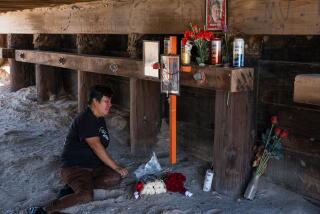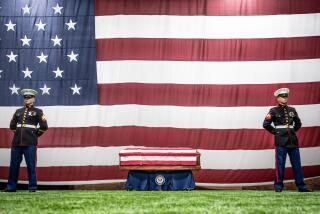Her Grief Rekindled : Mother of GI Casualty Knows the Feeling
- Share via
BUENA PARK — It was another war under another name against another dictator 13 months ago when Pfc. Roy Dennis Brown Jr. of Buena Park was killed in action. But his mother says the pain and loss will always be the same.
“I really feel sorry for the women going through this now,” said Julie Otto, whose 19-year-old son was the only soldier from Orange County to die in combat during the U.S. attack on Panama in December, 1989. “I know this is a tough time for them. It’s really hard to explain.”
Unlike Operation Just Cause when Otto was practically alone in her grief, Operation Desert Storm poses the threat of tragedy for many more mothers, fathers and children.
As U.S. warplanes attacked Iraqi targets on Wednesday, Otto, 44, reflected and noted the eerie similarities on the home front: People glued to their television sets waiting for the latest news. Families gathered to pray for loved ones, and friends and relatives calling to console each other.
“This is not an easy situation for anyone,” Otto said with sorrow in her voice. “I think about it (her son’s death) every day.”
Many relatives of military personnel, she predicted, are still coming to grips with the careers of their loved ones and the cause that might cost them their lives.
For Otto, the terms were fairly easy to accept 13 months ago. Her son loved being a member of the crack Army Rangers, so she supported him. And when he was called upon by President Bush to throw Gen. Manuel A. Noriega out of Panama, Otto supported that too, despite vocal opposition to the invasion by peace activists.
“Roy wanted to be where the action was; that’s what he signed up for,” she said.
Otto tried to view Operation Just Cause in a broader sense, much like she, and other military relatives, are doing now with the Persian Gulf crisis.
“The majority of the people I’ve heard against it say, ‘No Blood for Oil,’ but it’s not just oil. If we don’t stop Hussein now, he’s just going to go further,” Otto said. “It’s a shame. I wish it would have resolved itself in a different way, but I’d rather see the troops go in there now before Hussein has nuclear weapons and other things.”
In her son’s situation, “it was over drugs and this is over power,” she continued. “I guess they’re the same if you really look at it.”
But there are differences. Otto and her family did not have as much time to think about the prospect of a relative dying as is the case of families of service men and women in Saudi Arabia, who have been preparing for war since August.
“These women have been suffering for months. I’m not saying it was easy for us, it just seems like the agony wasn’t as prolonged,” she said.
When Brown went to Panama, Otto’s only clue about the impending military attack was a phone call from her son several days before the invasion.
“He knew he was going, but he couldn’t say where or when. He called to say that he loved us and to say goodby. He was scared and had been crying,” she recalled. “Like most people I didn’t know exactly what was going on or what his involvement was.” On Dec. 21, her worst fears were realized when an Army officer visited her home. “They don’t drop by just to say hello,” she noted. “In fact, he really didn’t have to say anything. I knew why he came.”
Her son was dead. Several weeks later, she learned that he was hit by “friendly fire,” accidentally shot and killed by his own troops. In all, 23 soldiers were killed and 324 wounded in the invasion that resulted in the capitulation of the Noriega regime. Compared to Operation Desert Storm, which involves an estimated 425,000 troops, about 24,000 troops fought in Operation Just Cause.
Otto’s only advice to those facing the loss of a loved one in the Middle East is to stay close to their families. “That’s what got me through,” she said. After a deep sigh, Otto added: “I hope no other women have to see a man in uniform come to their door.”
More to Read
Sign up for Essential California
The most important California stories and recommendations in your inbox every morning.
You may occasionally receive promotional content from the Los Angeles Times.













